Cuba to signal next steps after President Obama's visit
- Published
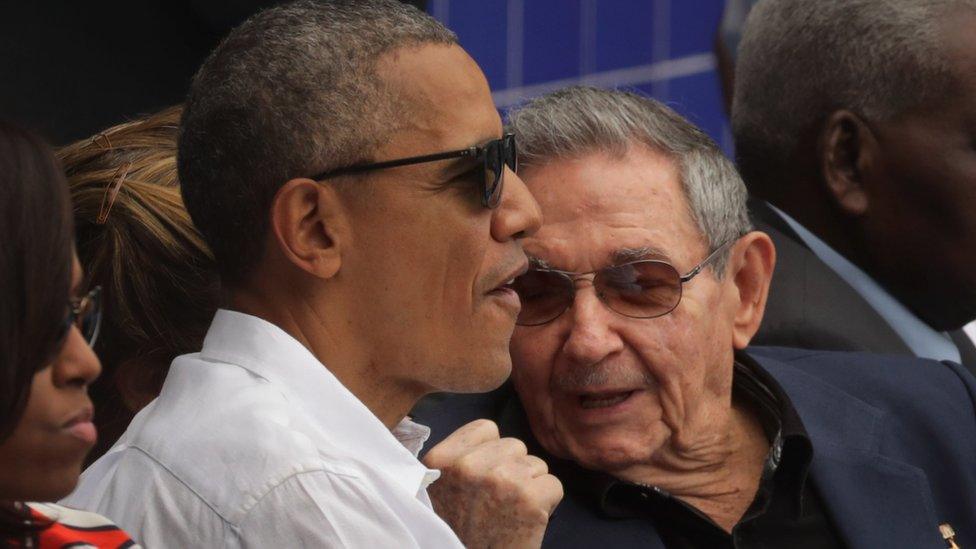
Critics say the Cuban government's exact position on the thaw with the US is unclear following President Obama's visit
As the Cuban Communist Party prepares for its Seventh Congress, the BBC's Will Grant looks at what message is coming from the party in the wake of US President Barack Obama's historic visit.
Just a glance around Havana's latest trade fair is enough to demonstrate the global interest in Cuba's gradually opening economy.
This month, it's the turn of the construction industry - a growing business in Cuba - and companies from France, Mexico, Brazil and Chile are among those with stands at the event.
The exhibition hall is thick with prospective clients leafing through glossy brochures, watching slick promotional videos or testing the products on show.

Companies from many countries are exhibiting at the construction trade fair
Everyone, it seems, is keen to get in on the ground floor of the island's emerging real estate and hospitality markets.
"We've heard there are over 120 hotels that are going to open here or begin construction over the next year and we want to be part of that," says Scott Banda, the marketing director of Bostik, the multinational adhesives brand.
Noticeably, US companies have also made the short trip to Havana in ever greater numbers since the thaw with Washington picked up pace.
"I've always had a real interest in Cuba and Cuban culture and art. It's an amazing art scene here," says Ted Acworth, the chief executive of Artaic, a Boston-based firm that makes mosaics from ceramic tiles for swimming pools and hotel lobbies.
"When I heard Obama had come here to more or less open up the relationship, it seemed to me like an interesting opportunity to come here, to learn about Cuba and see if there's any interest in my products."
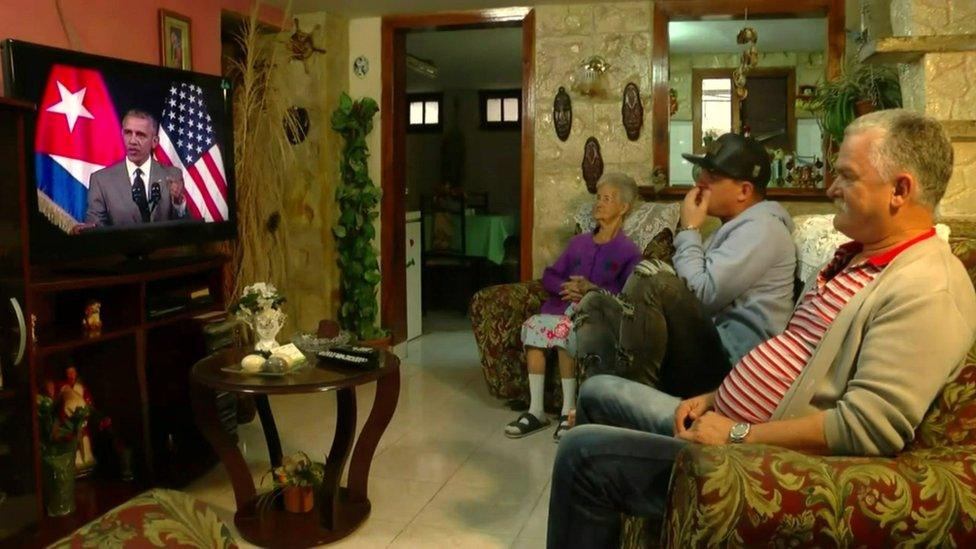
President Obama's visit last month made a big impression on many Cubans
President Obama's historic visit to the island is still fresh in the memory for Cubans, many of whom never thought they'd see the day a serving US president would address them live on state television in Havana.
His words of reconciliation, external moved many viewers to tears as the years of hostility seemed finally to be brought to an end when he quoted Cuban independence poet Jose Marti's immortal line: "Cultivo una rosa blanca" ("Cultivate a white rose").
'Obama is a showman'
But not everyone was entranced by President Obama's performance or his offer of "extending the hand of friendship to the Cuban people".
In the days immediately after the trip, Fidel Castro wrote a column in the state newspaper calling President Obama's words "honey-coated", external.
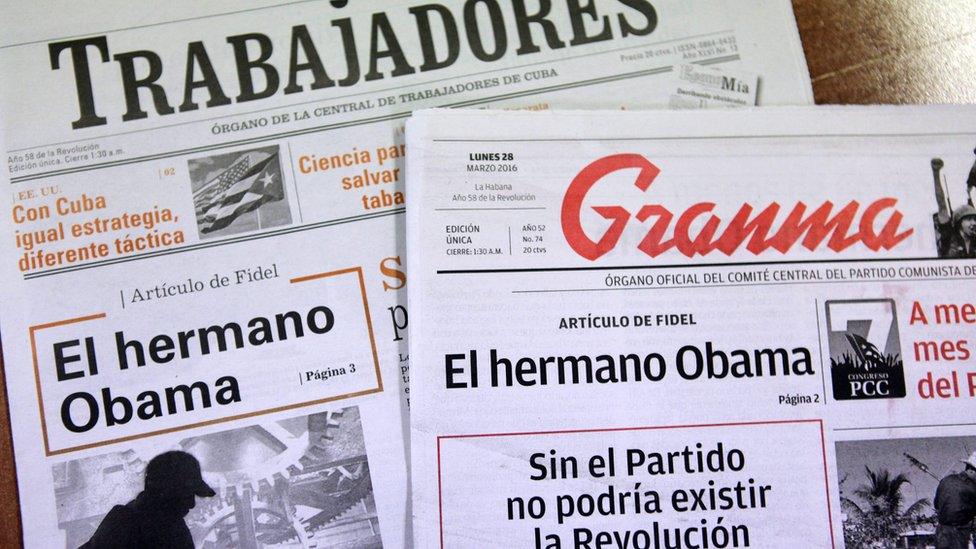
Fidel Castro's 1,500-word letter published in state media was entitled "Brother Obama"
In essence, Castro argued that Washington wasn't to be trusted and that "we do not need any gifts from the empire".
"Obama is a showman," says Hector Hernandez, vice-president of the state-run Institute for Studies of Jose Marti and long-standing member of the Communist Party.
"He's charismatic, he makes jokes, they prepared him well with Cuban phrases to say while he was here. He's a showman."
'Two visions'
But as the Cuban Communist Party's Seventh Congress gets under way, critics say the Cuban government's exact position on President Obama and the thaw with the United States still isn't clear.
"I wouldn't say it's a mixed message," says Hector Hernandez. "I think Fidel and Raul think the same way."
But he does acknowledge that "there are two visions" within the party of how best to proceed when it comes to the US.
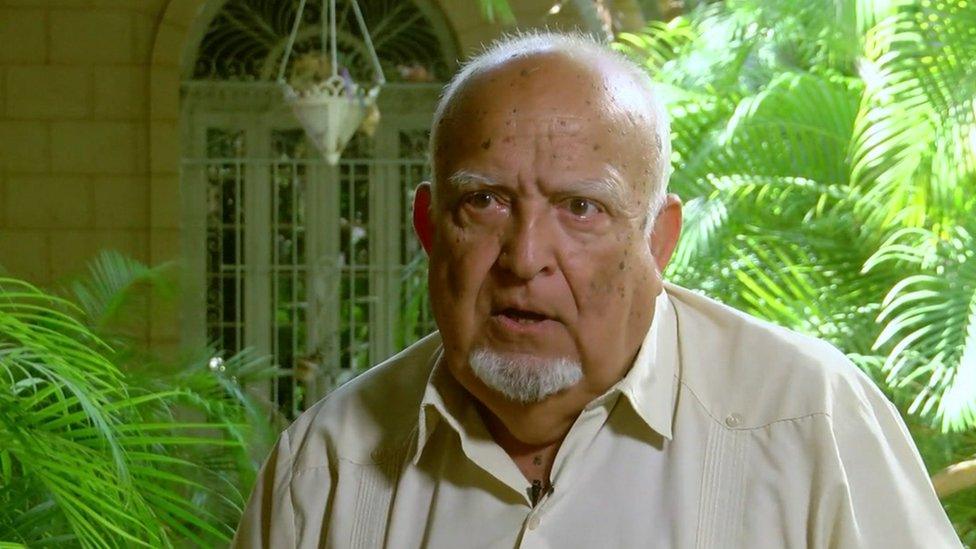
Hector Hernandez admits there may be different views in the party but they can complement each other
"There's those who don't want to forget the past and those who say they just want to turn the page. But I think these two things can complement each other. You can turn the page while still recognising and respecting the past."
While the improved relations with Washington have dominated the headlines, a great deal has happened in Cuba since the last CCP congress was held five years ago.

Cuba's Communist Party Congress
The Seventh Congress meets on 16-18 April
Meets every five years
Key body in determining Cuba's future economic and political course
About 1,000 party members will attend

Dissent in the ranks
At that meeting in 2011 a whole raft of economic reforms were agreed, 313 to be exact, intended to open the economy and allow a greater role for private enterprise. To date, by the government's own admission, only 21% of those measures have been implemented.
Before the previous congress, a nationwide debate was held with party activists and grassroots organisations to determine the country's new economic course. On this occasion, though, no such national debate has been held, prompting some open criticism from the party ranks.
One activist, Francisco Rodriguez, even took to writing an open letter to Raul Castro, the first party secretary as well as President of Cuba, in which he spoke of his "dissatisfaction" at "the lack of discussion of the central documents" before the congress.
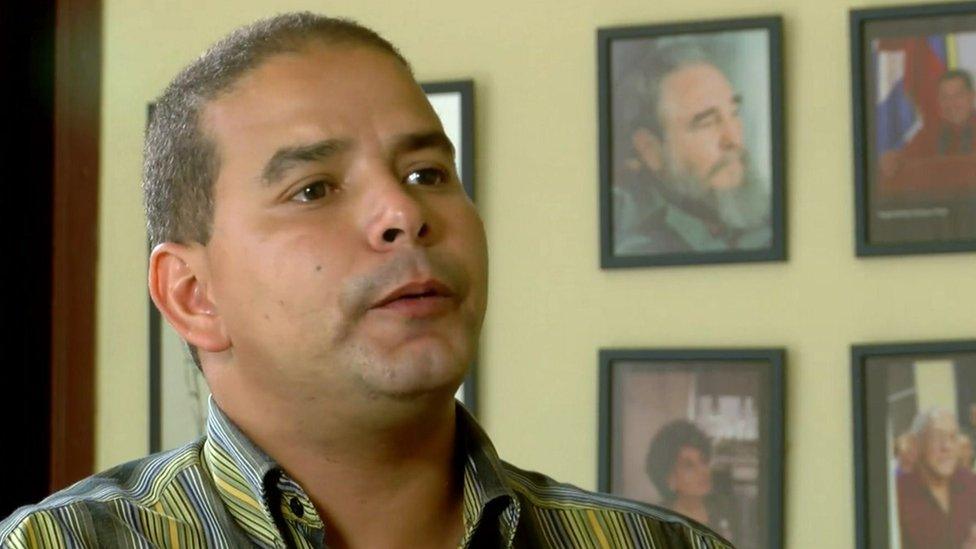
Rebel Youth editor Yoerky Sanchez says the agenda for the congress wasn't cooked up in secret
Normally the youth wing of the party leads the calls for greater transparency and democracy within the organisation. Yoerky Sanchez is one of the youngest deputies in the National Assembly and an editor at the state newspaper, Rebel Youth.
But he is firmly on message when it comes to the party's hierarchical decision-making processes.
"There could always be more democracy, a greater spirit of openness. You can never have too much democracy," he concedes.
"But the agenda for the party congress wasn't cooked up in secret by a handful of bureaucrats. It was debated by many representatives of society, including parliamentary deputies."
Succession preparations?
Maybe so, but the final documents are still not public and the sense of behind-the-scenes political negotiation contrasts sharply with the open demeanour of President Obama, who impressed ordinary Cubans with his frankness.
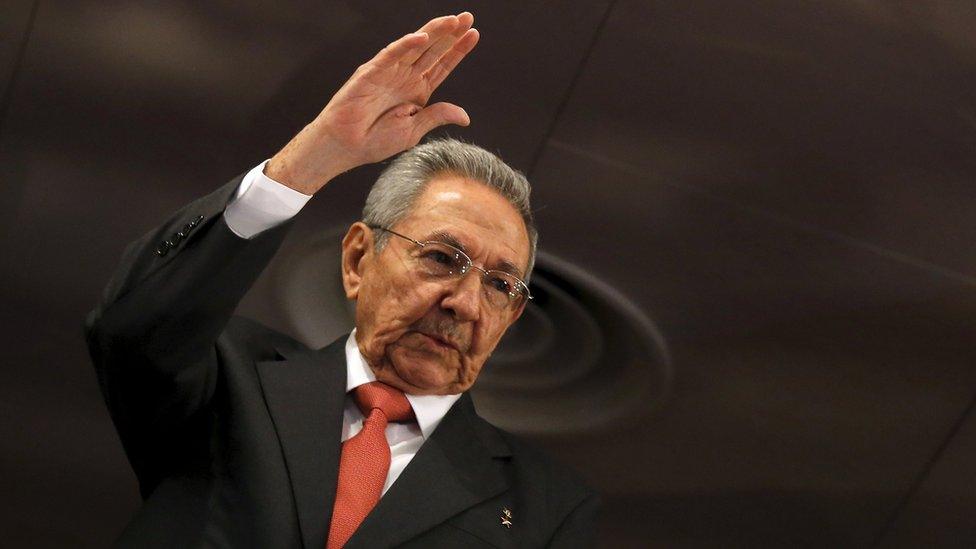
Raul Castro intends to hand over power in two years' time
Still, most Cubans will be watching the event closely.
The Party's Seventh Congress could involve some important announcements - including hitherto unprecedented changes to the political system. Raul Castro is 84 years old and has already made clear his intention to step down in early 2018.
The party hierarchy may choose to prepare the ground for his succession sooner rather than later.
When asked about the recent changes in Cuba, Communist Party activists often recite a popular slogan: "The changes will move Cuba towards more socialism, not more capitalism."
As Havana's construction fair makes way for the party congress, the next few days may show whether there is any substance to that oft-repeated claim.